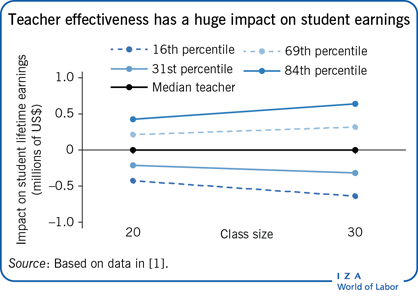Elevator pitch
Teacher effectiveness is the most important component of the education process within schools for pupil attainment. One estimate suggests that, in the US, replacing the least effective 8% of teachers with average teachers has a present value of $100 trillion. Researchers have a reasonable understanding of how to measure teacher effectiveness; but the next step, understanding the best ways to raise it, is where the research frontier now lies. Two areas in particular appear to hold the greatest promise: reforming hiring practices and contracts, and reforming teacher training and development.
Key findings
Pros
Pupils taught by highly effective teachers get significantly higher grades; the effect is substantial and enduring.
Teacher effectiveness improves long-term outcomes such as earnings.
There are robust and persistent measures of teacher effectiveness that are supported by expert observation and pupil feedback.
Standard estimates of teacher effectiveness seem reliable and not to suffer from bias related to pupil selection.
Cons
Research shows that teacher effectiveness is largely uncorrelated with the teacher’s own educational qualifications.
Teacher selection and hiring can be problematic because there is little useful information available pre-hire.
Some studies suggest that schools would benefit from a high optimal level of turnover among junior teachers, though recent research is re-opening the debate on the role of experience.
Tracking the persistent effects of training, mentoring, and development is difficult due to a general lack of longitudinal data.
